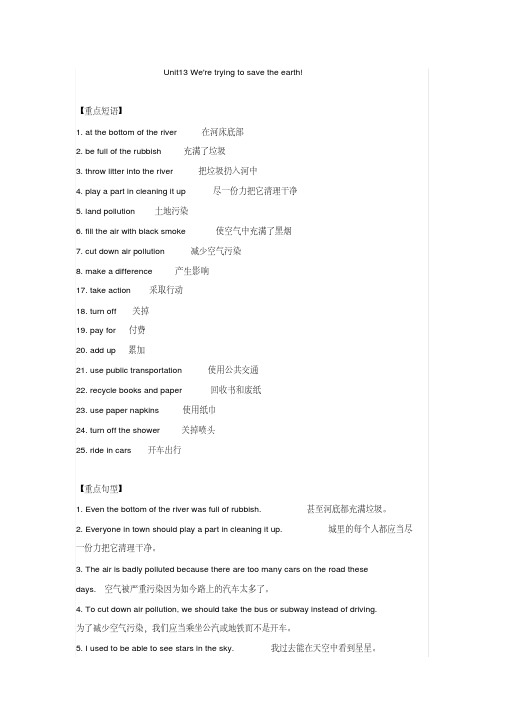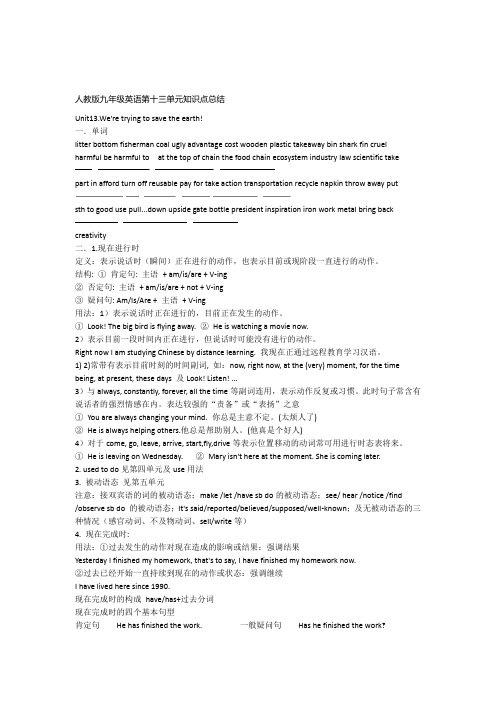完整版人教版九年级英语第十三单元知识点总结
人教版初三英语U13语法(第13单元语法)

我的妈妈去超市了。(人不在现场)
三、used to 的用法
used to “过去常常”, 可使用于各种人称, 后接动词原形
表示过去存在的但现在已停止的动作或状态。
(1) ed to do sth. 某人过去常常做某事(现在不再做了) e.g. I used to get up at six o’clock.
shark fins are good for health.
We should help save the sharks.
Modal verbs
一、现在进行时
一、定义: 表示现在正在进行或发生的动作。 强调动作正在进行。
二、结构: ① 肯定句: 主语 + am/is/are + -ing ② 否定句: 主语 + am/is/are + not + -ing ③ 疑问句: Am/Is/Are + 主语 + -ing
3、表示目前一段时间内正在进行,但说话时可能没有进行的动作 e.g.I am studying Chinese on the Internet these days.
我这些天正通过互联网学习汉语。 4、表示反复发生的动作,常与always,all the time 等连用,此时句 子常含有说话者的强烈情感在内。表达较强的 “责备”或“表扬”之意 e.g. He is always thinking of others.
the government close down the factories. Mark advises that
everyone in this town _s_h_o_u_l_d_ help to clean up the river not
九年级英语十三单元知识点

九年级英语十三单元知识点英语作为一门重要的国际语言,是我们学习和工作中必不可少的一部分。
针对九年级英语的十三单元,本文将重点介绍相关知识点,帮助大家更好地掌握这些内容。
第一部分:词汇在九年级英语的十三单元中,涉及了大量的词汇。
这些词汇包括名词、动词、形容词等等。
其中一些重要的词汇如下所示:1. Noun (名词)名词是指表示人、事、物或抽象概念的词语。
在这个单元中,我们学习了一些常见的名词,如"school"(学校)、"book"(书籍)等。
2. Verb (动词)动词是指表示一个动作、状态或事件的词语。
在这个单元中,我们学习了一些常见的动词,如 "read"(阅读)、"study"(学习)等。
3. Adjective (形容词)形容词是指用来描述或修饰名词的词语。
在这个单元中,我们学习了一些常用的形容词,如 "beautiful"(美丽的)、"interesting"(有趣的)等。
第二部分:语法除了词汇外,九年级英语的十三单元还包括了一些重要的语法知识。
这些语法知识主要涉及句子结构、时态和语态等方面。
1. 句子结构英语句子通常由主语、谓语和宾语组成。
在这个单元中,我们学习了简单句、复合句和复杂句等不同的句子结构。
2. 时态时态是指表示动作或状态发生时间的词语。
在这个单元中,我们学习了一些常用的时态,如一般现在时、一般过去时、一般将来时等。
3. 语态语态是指动作的主体和客体之间的关系。
在这个单元中,我们学习了主动语态和被动语态。
主动语态强调主语执行动作,被动语态强调动作的承受者。
第三部分:阅读理解九年级英语的十三单元中,阅读理解是一个重要的部分。
阅读理解既考察了学生对课文的理解,也需要学生掌握一定的阅读技巧。
1. 理解课文理解课文是阅读理解的基础。
这需要学生仔细阅读课文,理解文章的主题、主旨以及重要细节。
人教版九年级英语Unit13单词、课文,知识梳理,词汇句式精讲

人教版九年级英语Unit13单词、课文/知识梳理/词汇句式精讲Unit13 单词litter[litə(r)]v. 乱扔n. 垃圾;废弃物bottom[bɔtəm]n.底部;最下部fisherman[fiʃə(r)mən]n. 渔民;钓鱼的人coal[kəul]n. 煤;煤块public[p ʌblik]adj. 公众的;公共的n. 民众;百姓ugly[ ʌgli]adj. 丑陋的;难看的advantage[ ədva:ntidʒ]n. 优点;有利条件cost[kɔst; kɔ:st]v. 花费n. 花费;价钱wooden[wudn]adj. 木制的;木头的plastic[plæstik]adj. 塑料的n. 塑料;塑胶make a difference有关系,作用,影响shark[ ʃa:(r)k]n. 鲨鱼fin[fin]n.(.鱼)鳍cut off割掉;砍掉method[meθəd]n. 方法;措施cruel[kru:əl]adj. 残酷的;残忍的harmful[ha:(r)mfl]adj. 有害的chain[tʃein]n. 链子;链条ecosystem[i:kəusistəm]n.生态系统low[ləu[ a(.数量等)减少的;低的;矮的industry[indəstri]n. 工业;行业law[lɔ:]n. 法律;法规reusable[ri:ju:zəbl]adj.可重复使用的;可再次使用的afford[əfɔ:(r)d]v. 承担得起(后果);买得起transportation[t ænspɔ:(r)teiʃn]n. 运输业;交通运输recycle[ri:saikl]v. 回收利用;再利用napkin[næpkin]n. 餐巾;餐巾纸upside down颠倒;倒转gate[geIt]n. 大门bottle[bɔtl]n. 瓶;瓶子president[prezidənt]n. 负责人;主席;总统inspiration[inspəreiʃn]n. 灵感;鼓舞人心的人(或事物)metal[metl]n. 金属creativity[kri:eitivəti]n. 创造力;独创性WildAid[waildeid]野生救援协会(美国)WWF(World Wide Fund For Nature) 世界自然基金会Mark[ma:(r)k]马克(男名)Jason[dʒeisən]贾森(男名)Ken [ken]肯(男名)Hayes [heiz]海斯(姓)Jessica[dʒesikə]杰茜卡(女名)Unit13 知识梳理【重点短语】1. at the bottom of the river 在河床底部2. be full of the rubbish 充满了垃圾3. throw litter into the river 把垃圾扔入河中4. play a part in cleaning it up 尽一份力把它清理干净5. land pollution 土地污染6. fill the air with black smoke 使空气中充满了黑烟7. cut down air pollution 减少空气污染8. make a difference 产生影响17. take action 采取行动18. turn off 关掉19. pay for 付费20. add up 累加21. use public transportation 使用公共交通22. recycle books and paper 回收书和废纸23. use paper napkins 使用纸巾24. turn off the shower 关掉喷头25. ride in cars 开车出行【重点句型】1.Even the bottom of the river was full of rubbish.即使河底都充满垃圾。
最新人教版初中英语九年级第13单元知识讲解

最新人教版初中英语九年级第13单元知识讲解初中英语---unit13重点短语:1. environmental protection 环境保护2. air pollution 空气污染3. noise pollution 噪音污染 4. water poll ution 水污染5. in public 在公共场所;在公共地方6. mobile phones手机;可移动电话7.at the bottom of .......在……的底部 8. no more/longer 不再9. throw ……into把……扔进10.put ……into把……放进11.close down 关闭 12.be fu ll of rubbish 满是垃圾13.make a different to 对……有影响 14.burn coal 烧煤15.too much waste and rubbish 太多的垃圾 16.lead to 通向;导致17.take part in 参加 18. play a part in 在...中起作用,参与,扮演角色19. turn ……into把……转变为 20. clean up 把. .....打扫干净21. throw away 把......扔掉;丢掉 22.be able to有能力做23.cut down 砍倒;削减 24. instead o f 代替;取代25.bike riding 骑自行车(名词词组)26.waste pollution废弃物污染27.wooden chopsticks (一次性)木筷 28.plastic forks 塑料叉29.throw rubbish in the bins把垃圾扔进箱里 30.keep public places clean保持公共场所干净31.hear of/about 听说32.a bowl of shark fin soup 一碗鱼翅汤33.in southern China 在中国的南部 34.cut off 切除35.throw back into 扔回 36.be harmfu l to……对……有害37.at the top of 在……的顶部38. not only ...b ut also …不仅......而且......39. the food chain in the oce an’s ecosystem 海洋生态系统中的食物链40. in the last 20 to 30 yea rs. 在过去的20至30年中41.develop laws to stop the sa le of shark fin健全法律去阻止鱼鳍买卖42. environmental protection gro ups around the world 全球环境保护组织43.so far 当目前为止,迄今为止 44. scientific studies 科学研究45.be against (doing)反对做...46. can’t afford to do sth 不能承担做某事47.take action 采取行动 48. add up把......加起来;加起来49. ride in cars 开车出行 50.recycle books and paper 回收书和废纸51.put sth to good use 好好利用52.build sth .out of…用......来建造某物53. be an inspiration to sb成为某人的榜样 54. bring back 恢复;使想起重点句型:1. We’re trying to save the earth! 我们正在竭尽全力拯救地球!2. Here are some words relat ed to different kinds of pollution .这儿有几个与不同种类的污染有关的词汇。
人教版英语九年级全册单元unit 13 知识点+测试卷+思维导图

Unit 13 We are trying to save the earth.1.重点词汇:bottom, fisherman, coal, advantage, industry, law, gate, bottle, president, work, metal...2. 短语归纳:1. be full of 充满2. get in the shower 在洗淋浴3. leave sth in sp 把某物留在某地4. by the time... 到……的时候;到……之前5. be late for class 上课迟到6. go off 发出响声7. brush one’s teeth 刷牙8. give sb a lift 捎某人一程9. be about to 即将……;正要……10. stare at 盯着看11. in disbelief 疑惑地;不相信地12. take off (飞机等)起飞13. show up 赶到14. get a chance to do sth 得到一个做某事的机会15. leave for sth 动身去某地16. sell out 卖光17. lose weight 减肥18. run out of 用完3. 必背典句:1. We are trying to save the earth. 我们正在努力拯救地球。
2. The river used to be clean. 这条河过去是干净的。
3. The air is badly polluted. 空气受到严重污染。
4. No scientific studies have shown that shark fins are good for health.没有科学研究表明鱼翅对健康有益。
4.语法知识:英语句子成分分析组成句子的各个部分叫做句子成分。
它包括:主语、谓语、宾语、定语、状语、表语和宾语补足语等。
人教版九年级英语unit13单词讲解

人教版九年级英语unit13单词讲解九年级Unit 13单词讲解1.Litter (v.乱扔;n.垃圾;废弃物)XXX(请勿乱扔垃圾。
)XXX(街道上到处都是垃圾。
)2.Bottom (n.底部;最下部)At the bottom of the page (在页面底部)On top (在最顶端)The bottom of the cup is XXX(杯子底部破了。
)The apples at the bottom of the XXX(篮子底部的苹果较小。
)3.Fisherman (n.渔民;fish的复数形式)Fish (n.鱼;鱼肉)Fishermen (渔民的复数形式);go fishing (去钓鱼)We can XXX(我们可以看到很多渔民在河里钓鱼。
)4.Coal (n.煤;煤块;mine是代词;矿藏;v.采矿)Coal mine (煤矿);miner (矿工)The country is rich in oil and coal resources。
(这个国家石油和煤的资源丰富。
)5.Ugly (adj.丑陋的;难看的)This is an ugly face。
(这是一张丑陋的脸。
)6.Advantage (n.优点;有利条件;disadvantage是反义词)XXX of something to do something (利用(机会;时间等)做……)XXX (某事物的优缺点)Watching TV has both advantages and disadvantages。
While it can be a source of entertainment and n。
it can also lead to a XXX。
XXX of the fine weather to play tennis。
The past tense of "cost" is "cost" and the past participle is "cost." This shirt cost me a lot of money。
人教版英语九年级Unit13单元知识点归纳

Unit13 We're trying to save the earth!【重点短语】1. at the bottom of the river 在河床底部2. be full of the rubbish 充满了垃圾3. throw litter into the river 把垃圾扔入河中4. play a part in cleaning it up 尽一份力把它清理干净5. land pollution 土地污染6. fill the air with black smoke 使空气中充满了黑烟7. cut down air pollution 减少空气污染8. make a difference 产生影响17. take action 采取行动18. turn off 关掉19. pay for 付费20. add up 累加21. use public transportation 使用公共交通22. recycle books and paper 回收书和废纸23. use paper napkins 使用纸巾24. turn off the shower 关掉喷头25. ride in cars 开车出行【重点句型】1. Even the bottom of the river was full of rubbish. 甚至河底都充满垃圾。
2. Everyone in town should play a part in cleaning it up. 城里的每个人都应当尽一份力把它清理干净。
3. The air is badly polluted because there are too many cars on the road thesedays. 空气被严重污染因为如今路上的汽车太多了。
4. To cut down air pollution, we should take the bus or subway instead of driving.为了减少空气污染,我们应当乘坐公汽或地铁而不是开车。
完整版人教版九年级英语第十三单元知识点总结

人教版九年级英语第十三单元知识点总结Unit13.We're trying to save the earth!一.单词litter bottom fisherman coal ugly advantage cost wooden plastic takeaway bin shark fin cruel harmful be harmful to at the top of chain the food chain ecosystem industry law scientific takepart in afford turn off reusable pay for take action transportation recycle napkin throw away putsth to good use pull...down upside gate bottle president inspiration iron work metal bring backcreativity二.1.现在进行时定义:表示说话时(瞬间)正在进行的动作,也表示目前或现阶段一直进行的动作。
结构: ①肯定句: 主语+ am/is/are + V-ing②否定句: 主语+ am/is/are + not + V-ing③疑问句: Am/Is/Are + 主语+ V-ing用法:1)表示说话时正在进行的,目前正在发生的动作。
①Look! The big bird is flying away. ②He is watching a movie now.2)表示目前一段时间内正在进行,但说话时可能没有进行的动作。
Right now I am studying Chinese by distance learning. 我现在正通过远程教育学习汉语。
1) 2)常带有表示目前时刻的时间副词, 如:now, right now, at the (very) moment, for the time being, at present, these days 及Look! Listen! ...3)与always, constantly, forever, all the time等副词连用,表示动作反复或习惯。
- 1、下载文档前请自行甄别文档内容的完整性,平台不提供额外的编辑、内容补充、找答案等附加服务。
- 2、"仅部分预览"的文档,不可在线预览部分如存在完整性等问题,可反馈申请退款(可完整预览的文档不适用该条件!)。
- 3、如文档侵犯您的权益,请联系客服反馈,我们会尽快为您处理(人工客服工作时间:9:00-18:30)。
人教版九年级英语第十三单元知识点总结Unit13.We're trying to save the earth!一.单词litter bottom fisherman coal ugly advantage cost wooden plastic takeaway bin shark fin cruel harmful be harmful to at the top of chain the food chain ecosystem industry law scientific takepart in afford turn off reusable pay for take action transportation recycle napkin throw away putsth to good use pull...down upside gate bottle president inspiration iron work metal bring backcreativity二.1.现在进行时定义:表示说话时(瞬间)正在进行的动作,也表示目前或现阶段一直进行的动作。
结构: ①肯定句: 主语+ am/is/are + V-ing②否定句: 主语+ am/is/are + not + V-ing③疑问句: Am/Is/Are + 主语+ V-ing用法:1)表示说话时正在进行的,目前正在发生的动作。
①Look! The big bird is flying away. ②He is watching a movie now.2)表示目前一段时间内正在进行,但说话时可能没有进行的动作。
Right now I am studying Chinese by distance learning. 我现在正通过远程教育学习汉语。
1) 2)常带有表示目前时刻的时间副词, 如:now, right now, at the (very) moment, for the time being, at present, these days 及Look! Listen! ...3)与always, constantly, forever, all the time等副词连用,表示动作反复或习惯。
此时句子常含有说话者的强烈情感在内。
表达较强的“责备”或“表扬”之意①You are always changing your mind. 你总是主意不定。
(太烦人了)②He is always helping others.他总是帮助别人。
(他真是个好人)4)对于come, go, leave, arrive, start,fly,drive等表示位置移动的动词常可用进行时态表将来。
①He is leaving on Wednesday. ②Mary isn't here at the moment. She is coming later.2. used to do见第四单元及use用法3.被动语态见第五单元注意:接双宾语的词的被动语态;make /let /have sb do的被动语态;see/ hear /notice /find/observe sb do 的被动语态;It's said/reported/believed/supposed/well-known;及无被动语态的三种情况(感官动词、不及物动词、sell/write等)4.现在完成时:用法:①过去发生的动作对现在造成的影响或结果:强调结果Yesterday I finished my homework, that's to say, I have finished my homework now.②过去已经开始一直持续到现在的动作或状态:强调继续I have lived here since 1990.现在完成时的构成have/has+过去分词现在完成时的四个基本句型肯定句He has finished the work. 一般疑问句Has he finished the work?否定句He has not finished the work. 两回答Yes ,he has. No, he hasn't.特殊疑问句What has he done?在下列情形下用现在完成时1九词语①already 已经肯定句中或句尾I have already found my pen. = I have found my pen already.②yet已经否定句和疑问句句尾I have not finished the work yet.Have you bought a computer yet?③ever曾经句中Have you ever seen pandas?④never从不句中I have never been to Beijing.⑤just刚刚句中I have just done my work.⑥before以前句尾I have never been there before.⑦so far到目前为止So far he has learned 200 words.⑧how long多久How long have you lived here?⑨how many times多少次How many times has he been to Beijing?2两词组have<has>gone to去了某地例:He has gone to Beijing (去了北京,没回)have<has>been to去过某地例:He has been to Beijing. (去过北京,回了)4如果句子里面没有时间状语,汉语意思能够加“已经”,往往用现在完成时态。
Have you lost your library book? 你已经弄丢了从图书馆借的那本书吗?5现在完成时态还常常用于下列句型They have planted many trees in the last/past few years.This is the best book I have ever read.It is the first time I have played the computer games.在现在完成时中,一次性动词不能和一段时间状语连用例:He has bought the book for 3 years.(错)因buy这个一次性动词不能和一段时间for 3 years连用, 改正的办法有:He has bought the book.. (去掉一段时间for 3 years)He bought the book 3 years ago (改为一般过去时,使句子的意思不变)It's/It has been 3 years since he bought the book. = 3 years has passed since he bought the book. (改为固定句型It is/It has been ---since---)He has had the book for 3 years. (用延续性动词have代替buy)另外①come/arrive/get to/reach →be hereI have come here for 3 years.(错)改为:I have been here for 3 years.②leave/go →be awayHe has left for 3 hours.(错)改为:He has been away for 3 hours.③begin/start →be onThe film has begun for 3 minutes.(错)改为:The film has been on for 3 minutes.④open →be open / close →be closedThe shop has opened for 3 years.(错) 改为:The shop has been open for 3 years.⑤die →be deadHis father has died for 3 years.(错) 改为:His father has been dead for 3 years.be over→finish/end⑥.He has finished the work for 3 days.(错) 改为:The work has been over for 3 days⑦join I have joined the army for 3 years.(错)改为:I have been in the army for 3 years. 或I have been a soldier for 3 years.⑧buy /catch →haveI have bought the bike for 3 years.(错)改为:I have had the bike for 3 years.He has caught a cold for 3 days.(错)改为:He has had a cold for 3 days.⑨borrow →keepI have borrowed the book for 3 years. (错)改为:I have kept the book for 3 years.还有其它的归纳如下:break →be broken get up →be up marry →be marriedbecome →be lose →be lost5. 情态动词1) 情态动词本身有一定的词义,表示说话人的情绪、态度或语气,但不能单独作谓语,只能与其他动词构成谓语。
常见的有:can (could), may (might), must, need, shall (should), will (would)等。
2) 情态动词无人称和数的变化, 后接动词原形。
否定式是在情态动词后面加not。
个别情态动词有过去式形式, 也可用来表达更加客气、委婉的语气。
1.can和could的用法(1)can/could 表示“能力;许可;可能性”等。
could 为can 的过去式。
如:Can I use your bike?(2)can 用在疑问句中,表示征求意见、请求许可,答语仍用can; could 用在疑问句中,比can 更委婉、客气,是一种礼貌的说法,并不表示过去时态,答语用can,而不能用could。
